Sunday, December 31, 2006
DARK DAYS
Day after day on the book, with a little occasional light relief doing columns for e.g. Director magazine and – today – a wonderful email, in response to questions I asked him for the book, from Mitch Kapor, founder of Lotus Development Corporation, on issues around the triple bottom line and scaling. Huge temptation to post such gems immediately, but must try to keep at least some of the book’s powder dry!
Papers again full of the execution of Saddam Hussein. Dark times, though few people so richly deserved this end. Even so, a sense that those notionally in charge of the Iraqi invasion have little sense of how such things are likely to be seen in the round. Saddam, by contrast, seems to have been playing to a wider gallery for some time – even though some of his ploys, like comparing himself to my favourite Kurd, Salah el-Din, were laughable – given what Saddam did to the Kurds. And the complicity of the western powers in Saddam’s rise to power really ought to be the subject of a major inquiry.
Even as I write these words, however, I’m feeling happier than for ages, with the book trundling along well and so much time out. And even as I typed the first line of the paragraph above, Ruben Gozalez dead fingers, in the midst of playing Mandinga, segued into one of my favourite tunes of all time, La Curacha, which I first came across as a teenager in the film Flying Down to Rio. Late this afternoon, we took a walk around Barnes under lowering clouds, watching a pair of dogs swimming out into the Thames in chase of duck and gulls on the water, and then across the Common in wintry but wonderful rain.
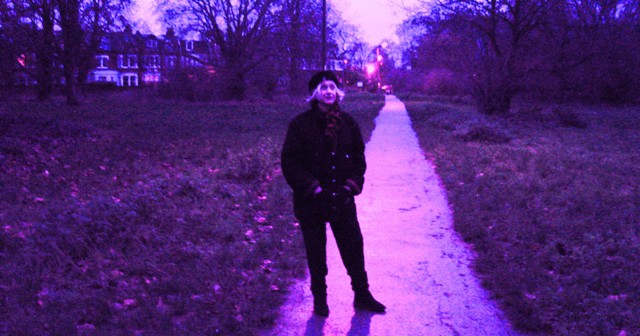
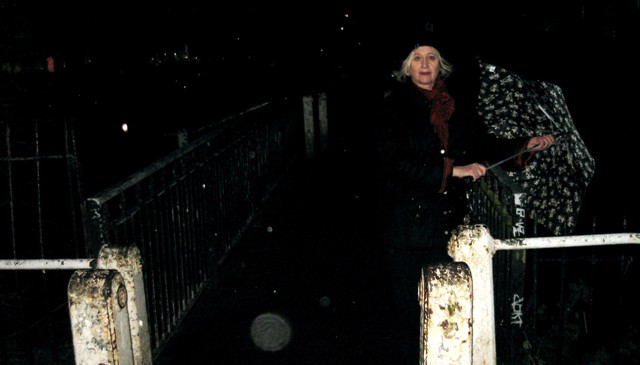
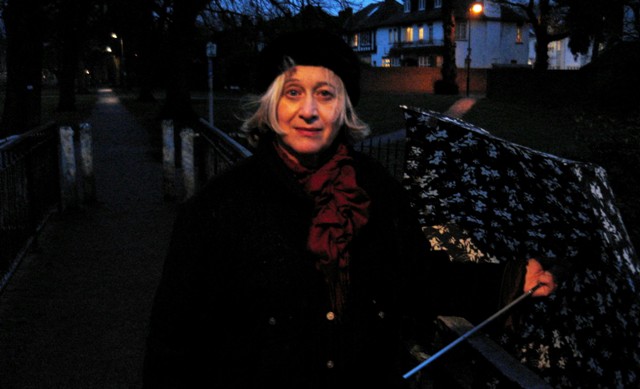
Thursday, December 28, 2006
KEW GARDENING
Maggie (Brenneke), the Oregonian who joined SustainAbility earlier this year to help run our Skoll Program, came across to lunch today with her mother and aunt, and then we all drove across to Kew Gardens for a meander. The Gardens were wonderful and the weather weirdly balmy, with a clearish blue sky, and ice-skating rink in full tilt. The most astonishing array of flowers and flowering shrubs in bloom, in the open, which must be making someone nervous about what will happen with the first really hard frost.

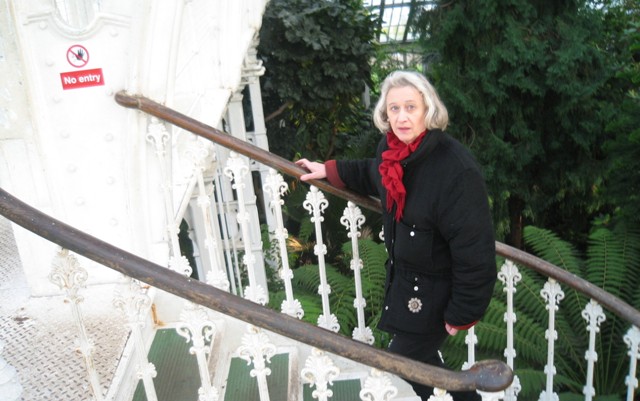
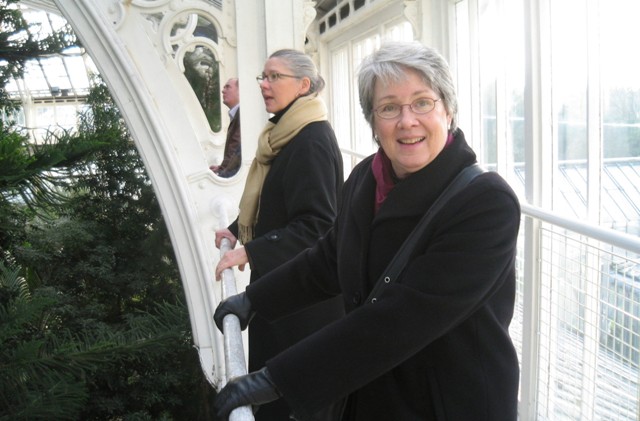
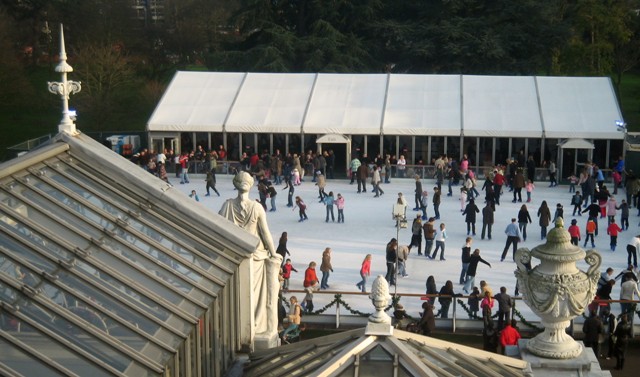

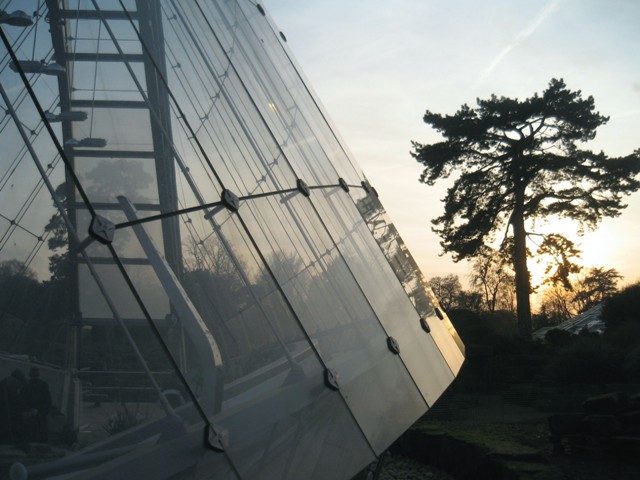
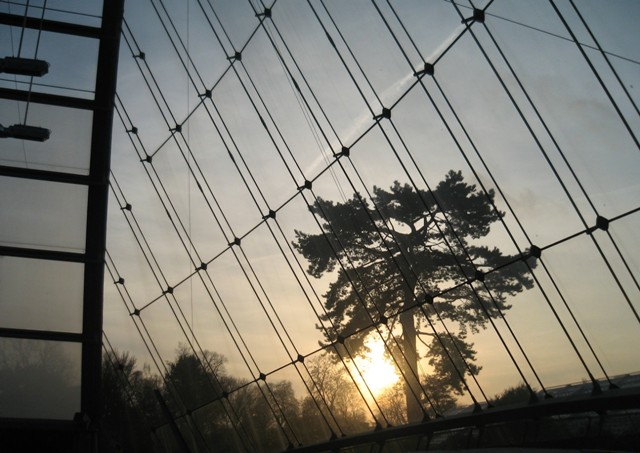
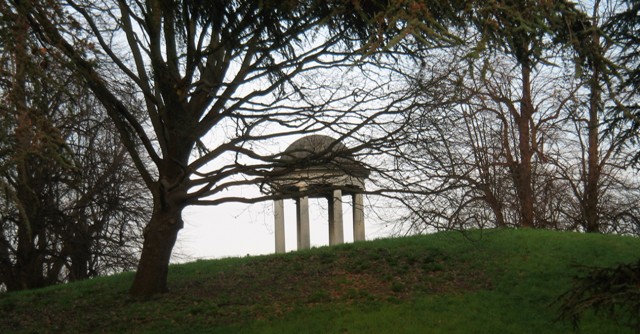
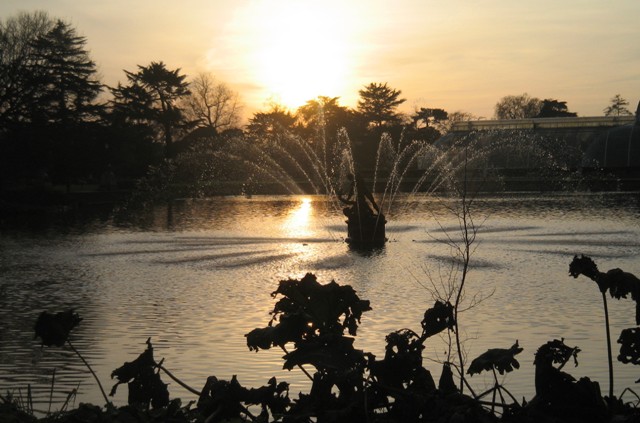
EARTHQUAKES
With Hania staying up near Dumfries, we noted the Boxing Day 3.5 magnitude earthquake that hit the town yesterday with more than a little interest. Reminded me of the earthquake that hit Mossley the night before the funeral for Elaine’s father, shaking her awake.
INTERGENERATIONAL EQUITY, WWII VERSION
This week, according to today’s Times, Britain will pay the last instalment of the US$4.3 billion loan given us in 1945 – and Canada will also receive the last payment on its parallel Can$1.25 billion loan. At the time, John Maynard Keynes had apparently warned that the war had left Britain facing a “financial Dunkirk,” which the loans helped us deal with. The whole Lend Lease agreement was an extraordinary form of intergenerational equity transfer, and – from my perspective, at least – more than worth the price in terms of helping rid the world of the Nazis. Thank you FDR.
Friday, December 22, 2006
FOGGED
The fog that replaced the wonderful blue skies of a while back really have hunkered in for the duration. As I cycled in to Holborn on a couple of mornings earlier in the week, my glasses frosted with moisture, the damp cold went deep. Several colleagues flying to Germany were severely disrupted by the huge wave of flight cancellations, among them Tell Muenzing, who came over to Barnes for tea yesterday, before we headed out to see old friends in Richmond. Otherwise have been tidying up loose ends from 2006, refreshing our connections with our far-flung Faculty with the help of Sam (Lakha) and working on a major revamp of the new book. Oddly, despite the fog, am feeling brighter than for a while – perhaps because of the prospect of the break, even though bulk of it will be book writing.
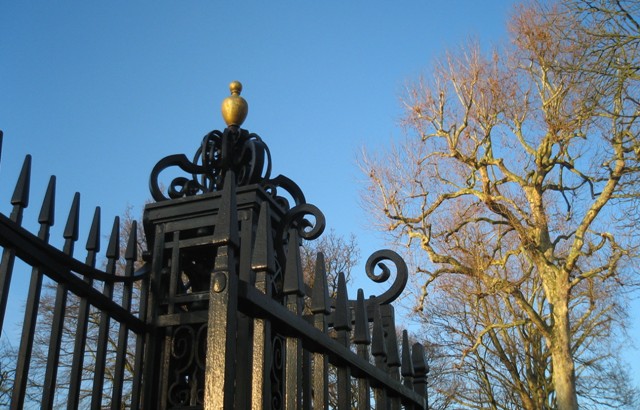
Richmond Park last weekend

Kensington Gardens as I cycled through earlier in the week
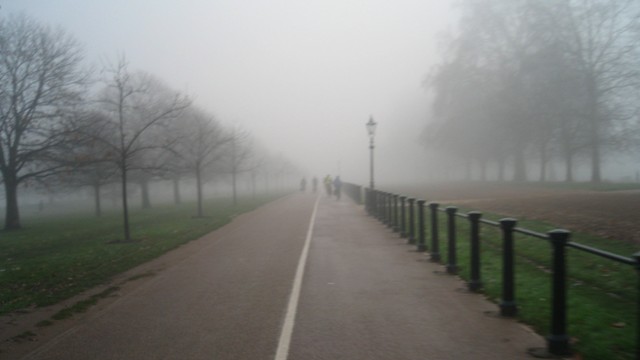
Rotten Row, ditto
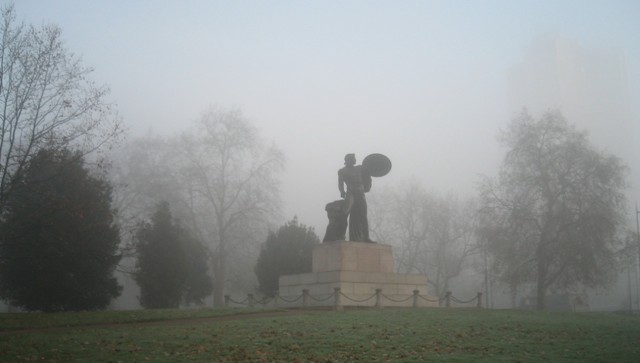
Wellington Memorial statue of Achilles, which our old Knightsbridge office overlooked
Wednesday, December 20, 2006
VENUS
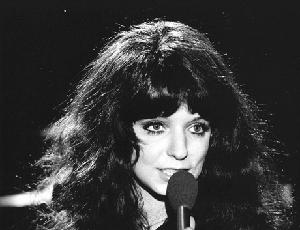
A whole slew of rock and pop obituaries appeared in today’s Times. One was of Denis Payton, of The Dave Clark Five, who I confess to having liked during the British Invasion of the US era of pop. But the one that really caught my eye was that of Mariska Veres, front-woman of the Dutch band Shocking Blue.
Venus was the only track of theirs I think I ever heard, but I still remember the shock of recognition and pleasure when we turned the Landrover into a gas station in Greece in 1970 and a big truck pulled in behind us. The driver opened his door just as the opening chords of Venus crashed out. Stunning – and if you want a taste, try searching for Shocking Blue on iTunes. The band sank pretty much without a trace after this one mega-hit, though Nirvana (the obituary notes) turned the song into a grunge anthem. News to me.
An odd thing was that during the same two-month journey around Greece, with a long sojourn on the island of Skiathos, we came across Geoff Lye (later a Director of SustainAbility from 1994) in the Pelepponese. He was with a group of folk in a London taxi – and it was only many years after he joined us in SustainAbility that we ultimately, serendipitously worked out that he was one of the folk in that taxi while Elaine and I were among the folk in the Landrover, our family wheels for many a year.
Saturday, December 16, 2006
COPSE HILL
Despite bright blue skies all day, I woke under a dark cloud, not at all helped by reading the newspaper accounts this morning of the Government’s spiking of the Serious Fraud Office investigation of bribery and corruption in defence industry contracts with the Saudis. Disgraceful. Growing sense that the House of Saud will collapse in wreckage and flames, and sooner than we might imagine, potentially dragging much of the western economy with it. If this scenario plays out, we will have no-one to blame but ourselves.
Then, early this afternoon, drove across to Christ Church, Copse Hill, West Wimbledon, with Jane Nelson, for memorial service for Ian Christie’s wife, Caroline. Darkly tragic, but with flashes of humour. Good to see people like Nick Robins, who has just produced a fascinating book on The East India Company, which he bills as the world’s first transational corporation (http://www.opendemocracy.net/debates/article-7-29-904.jsp), and Michael Jacobs, now working with Gordon Brown. Brown’s idiotic decision on the Operating & Financial Review (OFR) makes him highly suspect in my eyes, but he does seem to be doing some interesting things behind the scenes on energy markets and carbon capture.
Friday, December 15, 2006
RUSSIAN OR AMERICAN ROULETTE?
Could never watch that scene in The Deer Stalker, where the Vietcong forced prisoners to play Russian Roulette. But at least it was Russian, with only one loaded chamber, whereas American Roulette (at least as one person today defined it) involves using a gun with only one empty chamber. Spent much of the day at the Royal College of Surgeons with faculty members of the University of Cambridge Business & Environment Programme (http://www.cpi.cam.ac.uk/bep), together with some of the world’s leading climate change experts. Came away believing that, as the same participant put it, we are increasingly playing the American version of roulette with our climate. A strong sense, too, that we are within a few years of being “beyond the tipping point.”
One subject was Venice, where the barrage to keep back a sea-level rise of some 12 cm is set to cost 20 billion euros, whereas some of experts are now talking about up to 50-metre sea-level rises as “domino dynamics” switch in. It’s not just an issue of a possible $1 trillion storm hitting the Gulf of Mexico in the near future but of Europe increasingly switching to a monsoon regime, the monsoons ending in India, the Great Barrier Reef dead in just a few decades as the oceans acidify, or “go sour,” a process that will itself slow the oceanic absorption of carbon, and the death of the Earth’s green lungs, in Amazonia.
One line that sticks in my mind is the gloomy conclusion that “the choice is now between taking a dangerous gamble with the planet – and taking a disastrous gamble.”
Then across to the office and on to a restaurant in north London with the SustainAbility London team, to celebrate the impending holidays and to mark Geoff Lye’s move to non-executive director status after well over a decade with us. Happily he will be spending a growing proportion of his time on climate change at Oxford University’s Environmental Change Institute (http://www.eci.ox.ac.uk/), which should help us put our foot on the gas in this critical area.
Thursday, December 14, 2006
FROST/NIXON
Across to Café Fish for supper with Hania, including six oysters between us, then on to see Frost/Nixon at the Gielgud Theatre. Am not much of a theatre-goer, but it turned out to be a fascinating study of one of the most flawed politicians of modern times. Also an extraordinary insight into the entrepreneurial risks David Frost took in getting the four-part interview onto the world’s TV screens – the most-viewed news programme of all time, they say. Almost a disaster, though, as Nixon fended off the ravening Frost, until the latter managed to shuck the former, prizing him out of his post-presidential shell. Left you feeling almost sorry for Nixon. Michael Heseltine and party arrived shortly after us – and I found myself wondering what such a politician would have made of it all …
Wednesday, December 13, 2006
CREATIVE JUICES
A day when the creative juices ran energetically. Began by taking the Tube to Holborn and reading the latest issue of the Harvard Business Review, particularly the Michael Porter article on the need to reinvent corporate social responsibility (CSR) and Clayton Christensen’s article on the need to apply radical innovation to social issues.
Shortly after I arrived in the office, Rupert Bassett – our designer – arrived and we had a wildly productive session with Ritu (Khanna) and Ivana (Gazibara) on our future-of-globalization project. Next a brief catch up with Julia Hailes on her new book, then back into another highly productive session with Maggie (Brenneke) and Sophia (Tickell) on our upcoming survey of social entrepreneurs.
Took Ivana and Jean-Philippe (JP) Renaut, both of whom joined us this year, to Galleria Charlick for lunch – where we were told that the Galleria team had seen my earlier blog reference to them. The menu may be limited, but the food is consistently excellent. And I love their ‘Power Juices,’ which mix the most unusual ingredients.
Then back to the office for further meetings and work on a proposal for a project I’m hoping to do with The Environment Foundation (http://www.environmentfoundation.net) next year, before going out to dinner with Lawrence Bloom (http://www.lawrencebloom.com/) – with whom I am facilitating a session on the future of cities at the World Economic Forum Davos summit in January.
Sunday, December 10, 2006
LITVINENKO
The newspapers are still full of the fall-out from the poisoning of former Russian spy Alexander Litvinenko, the reality of which was brought home to me when – on my way to St James’s Palace earlier in the week – I walked past the front of the now-closed-for-decontamination restaurant where the story first surfaced. Here’s the photo I snapped in passing.
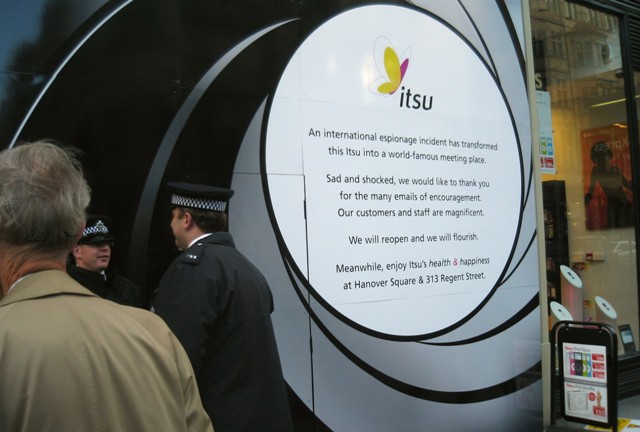
Itsu, sad and shocked
THE WEEK THAT WAS
A fair amount of through traffic in the London office this week, including Laura Pérez Arce from the Sierra Gorda Biosphere Reserve (http://www.schwabfound.org/schwabentrepreneurs.htm?schwabid=325), already blogged on the SustainAbility website (http://www.sustainability.com/blogs/skoll/skollblog1.asp?id=914, 5 December entry), the Formula Zero team (ditto, http://www.sustainability.com/blogs/skoll/skollblog1.asp?id=914, 8 December entry) also at and Sara Olsen of SVT (http://www.svtconsulting.com/index.html), who focuses on social return on investing (SROI).
Then, yesterday, I took part in the latest meeting of the Board of Trustees of the Business & Human Rights Resource Centre (http://www.business-humanrights.org/Home). Amazing how far things have come along, with a fantastic group of interns from around the world – and we also approved designs for a revamp of the website, which should make it much more visually appealing and accessible.
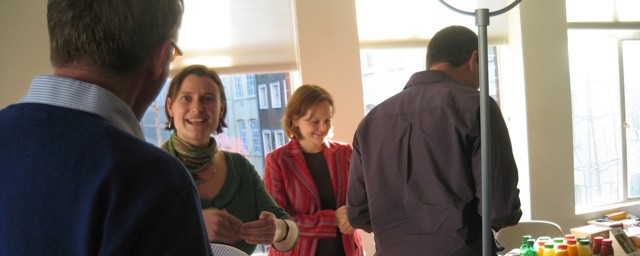
Lunch arrives @ B&HRRC
Next, back hotfoot to Barnes to help Elaine with preparations for dinner with Doug (of GlobeScan) and Margot Miller, Steve (of Greenpeace Business) and Sandar Warshal, and Gaia, Hania and John. Wonderful evening which once again underscored how privileged we are to work in an area with such extraordinary friends involved.
Wednesday, December 06, 2006
“RATHER A GOOD VINTAGE”
A glorious pale Moon hung over Victoria as I walked across Vauxhall Bridge for a breakfast meeting with Nike in John Islip Street. Mark (Lee) and I had expected breakfast, but instead we found ourselves dropped straight into an intense brainstorming session with around ten Nike people – fascinating discussion over an hour-and-a-half. Key issue is that Nike is dropping the supplier in Pakistan which originally got it into difficulties around child labour, because of endemic corruption, but is keen to work out how to help the local communities transition to new forms of employment. One possibility: various new business models based on – or linking out to – social enterprise.
Then back to Holborn, before shortly thereafter retracing at least some of my steps to St James’s Palace, for the launch event of Prince Charles’ new ‘Accounting for Sustainability’ initiative (http://www.accountingforsustainability.org.uk). Intense security as we threaded our way into the Palace, probably amplified by the fact that Tony Blair was speaking, too. Extraordinarily rich networking over lunch, before the session began, after which we all diligently trooped in to hear James Naughtie of the BBC’s Today programme chair a panel session on the new initiative.
Prince Charles noted that accounting is often seen as “an ancient and even mystical practice,” although much of it has evolved since WWII. In the same way that accountants had to embrace such issues as pension costs and foreign currency trading issues in the late twentieth century, HRH argued, so now they will have to embrace a growing range of social and environmental costs. To date, however, the art is ill-developed, so companies don’t ask themselves such questions as, “How many miles of polar ice cap have we helped melt this year?” No-one is accounting for these costs, HRH observed, though we will all end up paying for them – indeed, we are “running up the biggest credit card debt in history.”
Tony Blair congratulated HRH on being consistently “way ahead of your time” on environmental issues, and wryly noted that he had just left Question Time in the House of Commons in pursuit of a more kindly – and “better paid” – audience. He seemed moderately optimistic about the climate challenge, arguing that, “This is not an impossible thing to do.” But then optimism is the stock-in-trade of politicians. He, like other speakers, referred a number of times to the recent Stern Review on climate change, describing the issue as “the most serious threat that mankind faces.”
The Bishop of London noted that “we’re all afloat in the same planetary Ark,” stressing that those in First Class accomodation won’t long outlast those drowning in steerage. Lord John Browne of BP, meanwhile, warned that too much of today’s accounting is “backward looking,” with a growing need to develop forms of accounting and reporting that are forward-looking. We increasingly need a universal language to embrace triple bottom line impacts, he said.
Meanwhile, a giant portrait of Cardinal Richelieu loomed over the proceedings, and I wondered what a man who died in 1642 would have made of all this? Interesting to recall what a shot in the arm to the English economy Richelieu’s destruction of the power of the French Huguenots was, rather like Hitler forcing out the Jews who would later do so much to contribute to the Allied war effort.
Towards the end of the event, Prince Charles came back on stage and mentioned that he was the same age as Al Gore, who had just appeared by video link. Theirs had proved, he opined, a “rather good vintage,” which I am pleased to believe, since I am the same age. Overall, however, and whatever the outcome of the Accounting for Sustainability project, due to report in a year or so, I found the panel discussion disappointing – with too many senior people from business professing to be on top of the climate issue, when the reality is that no-one is. Indeed someone from one of our client companies told me over lunch that the more he reads about climate change, the more worried he becomes – not least because his home in The Netherlands is technically well below even today’s sea levels.
Tuesday, December 05, 2006
SARA PARKIN, 60 + 40
After a blizzard of meetings, including a hugely energising lunch with Laura Pérez Arce of the Sierra Gorda Biosphere Reserve in Mexico, followed by a US teleconference on the knowledge and education requirements for successful social entrepreneurship, I travelled across to The Geffrye Museum (“of English Interiors from 1600 to the present day”) for a party to celebrate the sixtieth birthday of Sara Parkin, plus her 40 years of campaigning to date. She was a leading light in the European Green Party movement and then a founder-director of Forum for the Future (http://www.forumforthefuture.org.uk). Wonderful gathering of the tribes, with delicious food by Maria Clancey and Passion Organic.
Monday, December 04, 2006
TEST SITE
Up very early with Elaine and across to Tate Modern, with wonderful, balmy walk along the South Bank from Waterloo. Invited to breakfast by Unilever to see the latest Carsten Höller show, Test Site. The artist says his slides are sculptures you can travel inside – and asks what the effect would be if we all did more sliding as part of our daily lives? He suggests that sliding in this way is a means of experiencing “voluptuous panic.” Certainly it was less unpleasant than my normal experience of sliding, when my cycle loses traction on ice at speed.
We both commit our bodies to the depths, riding sacks that are reminiscent of those they use to send dead seamen overboard. You do indeed feel ‘transported,’ building up an extraordinary, juddering momentum as you come down, particularly from the fifth floor (a 58-metre ride). I felt quite set up for the rest of the day – which included a briefing session on an event I am due to do in Bangalore early next year, another on a survey we are planning as part of our Skoll Program, and then another Tubular journey across to Canary Wharf for a meeting of the ECGD Advisory Council. On the way, I espied the most extraordinary slip of a boat, that looked like something out of James Bond, or the as-yet-unmade film The Alien Seedpods Have Landed.
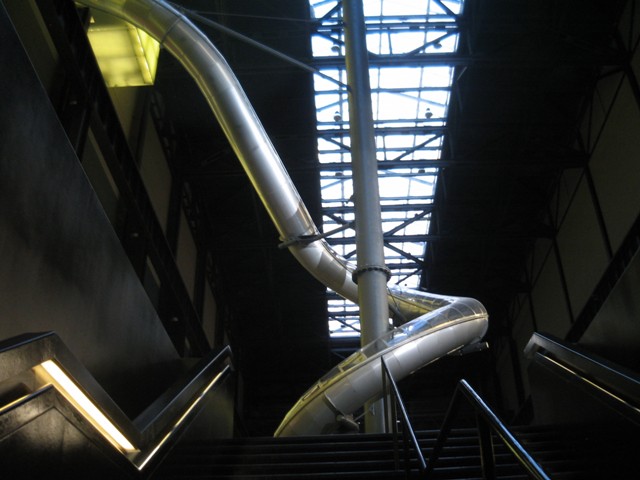
Test Site 1
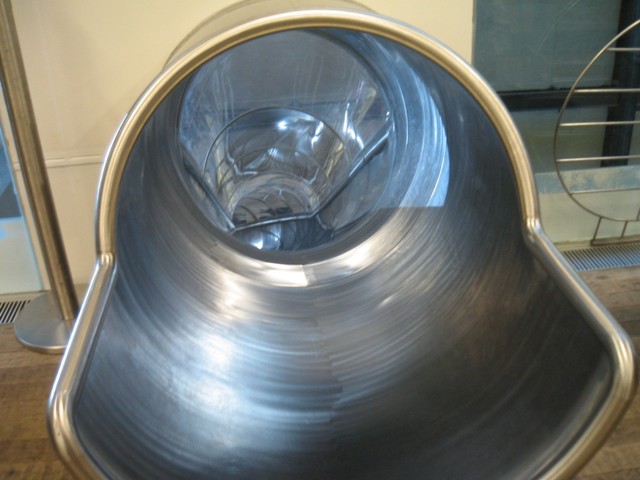
Gaping maw
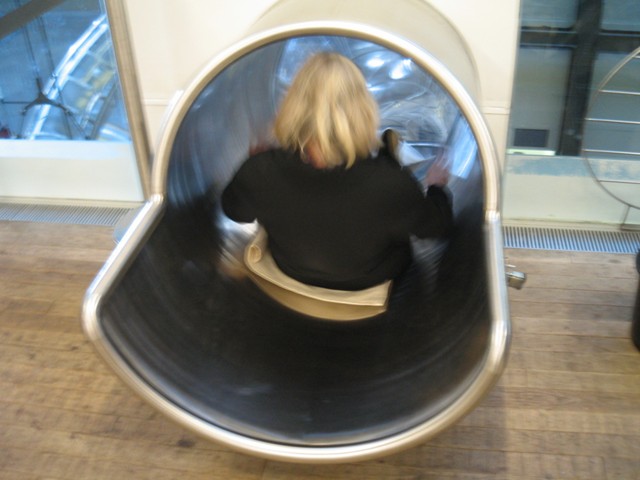
Elaine inserted
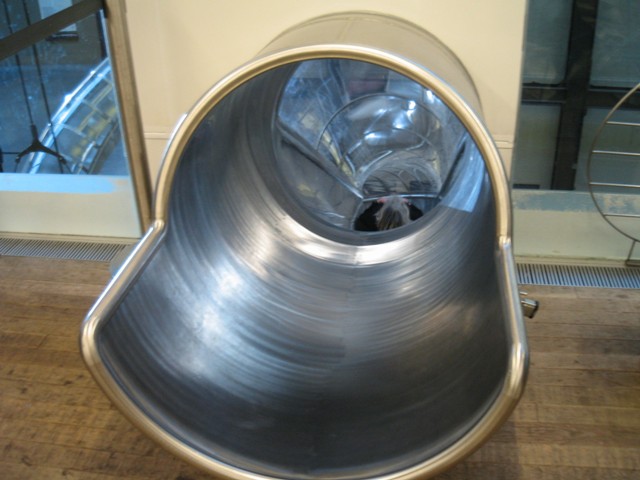
Swallowed
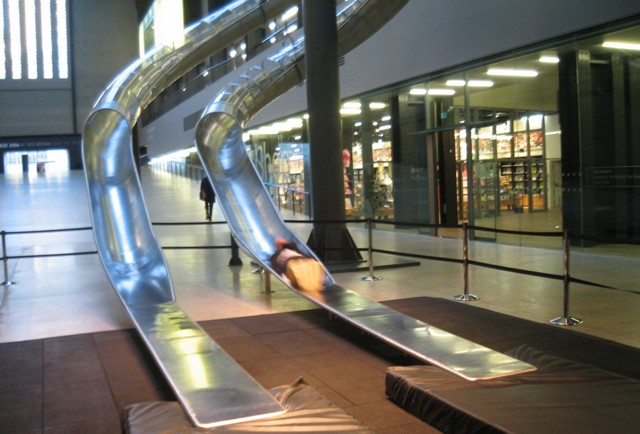
Another body blurs by
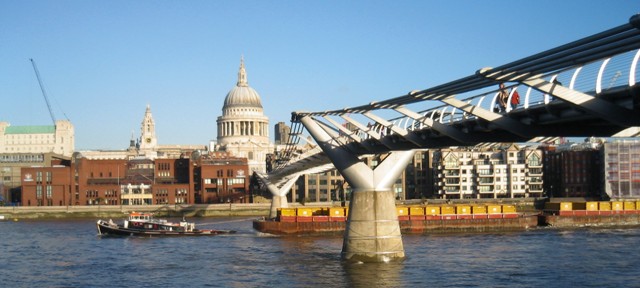
Millennium Bridge

Is it a boat, is it a …?
Sunday, December 03, 2006
INTO THE WEST WITH THE ACCIDENTAL ANGLER
Catching my breath after marathon bouts working on the book, I watched the Custer’s Last Stand episode of Steven Spielberg’s TV miniseries, Into the West (http://alt.tnt.tv/itw/), billed as a “Journey to the Heart of the American Dream.” More like a nightmare. The Little Bighorn massacre was portrayed as it is now thought to have happened, over in less time than it takes “a hungry man to eat his dinner,” or words to that effect. What a fool George Armstrong (should have been Headstrong) Custer was, though the battle-site, which we visited many years ago, is one of the most beautiful memorials I have seen, particularly the tiny Indian prayer-bundles hidden away in the brush.
The most grotesque part of the nightmare was the subsequent tearing away of Indian children to be carted off to a school that would reprogram them, forcing them to eat soap any time they used their own language, and making them choose new names: Hiram, Meredith, Walter … Felt huge synmpathy for the boy called ‘Voice That Carries,’ who had seen the Battle of the Little Bighorn from afar, and ironically gets stuck with the name George.
Then we watched the last program in a wonderful series, The Accidental Angler, in which Charles Rangeley-Wilson, who we have seen fish in some the world’s most exotic locations, returns to London to try to catch native brown trout in the Thames tributaries. However hard he tries, though, he fails, working his way progressively further into the west. In the end, he ventures as far west as Rickmansworth, near where I was born in a mill cottage alongside the Kennet (http://johnelkington.com/babelfish.htm). A sense of coming home – and then he finally catches his trout, just as the fishing season draws to a close.
He ends up in tears at the grotesque things he has seen dumped into the various tributaries, but there was one upbeat moment where he watched conservationists working to restore the upper reaches of the Wandle.
Friday, December 01, 2006
JOOLS AND LULU
Finally made it to the Jools Holland rhythm & blues concert at the Royal Albert Hall – and it was hugely worth the angst in getting there. Elaine, Gaia, Hania, John and I sat up in the Gods, or at least the Choir. Was blown away by the persussionist, Gilson Lavis. Unexpected ingredient in the mix was Lulu, whose bluesy style these days I find surprisingly engaging. And one of the encores was a favourite song, written in 1948, a year after Elaine was born, a year before I was – Enjoy Yourself, It’s Later Than You Think, which runs something like this:
Enjoy yourself, it’s later than you think
Enjoy yourself, while you’re still in the pink
The years go by, as quickly as you wink
Enjoy yourself, enjoy yourself, it’s later than you think …
Sums things up, really.
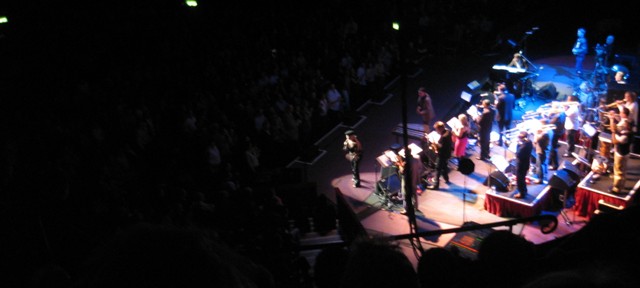
Lulu prowls, Jools plays guitar
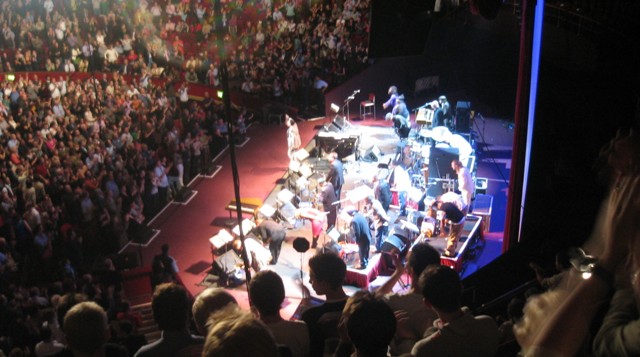
Jools takes a bow
ALCOA FOUNDATION
Back today from a couple of days in Brussels with the Aloca Foundation, which hosted a conference entitled Advancing Sustainability. More details at http://www.alcoa.com/global/en/news/news_detail.asp?pageID=20061201005300en&newsYear=2006.
My speech kicked off today’s session, and was followed by a panel discussion chaired by Meg McDonald (President, Alcoa Foundation), where I appeared alongside Magnus Johanesson (Secretary General, Iceland’s Ministry for the Environment), Tom Lovejoy (President, John Heinz III Center for Science, Economics and the Environment), David O’Connor (Chief, Policy Integration and Analysis Branch, UN Division for Sustainable Development) and Leena Srivastava (Executive Director, The Energy and Resources Institute, India).
One performance indicator: within minutes of finishing, I had been invited to speak – by different people – in Australia, Brazil, Mexico and the US.
Sadly, though, I had to miss the afternoon session with Joseph Stiglitz, in order to get back to London for this evening’s Jools Holland concert. But, as events turned out, I should have stayed and heard him since the flight was delayed for over two hours. When we got back to Heathrow, a rain storm had just passed through, so the plane squatted on the runway for 25-30 minutes, after which the near-suicidal pilot came on the intercom to say they couldn’t pull into the jetty because some electronic beacon had failed. Because I was by now wildly late, and Terminal 4 isn’t currently served by the Underground, I jumped into a cab – and ran smack into lava-like gridlock. Eventually got to the Royal Albert Hall 15 minutes before the show started, borne along on a riptide of adrenaline.
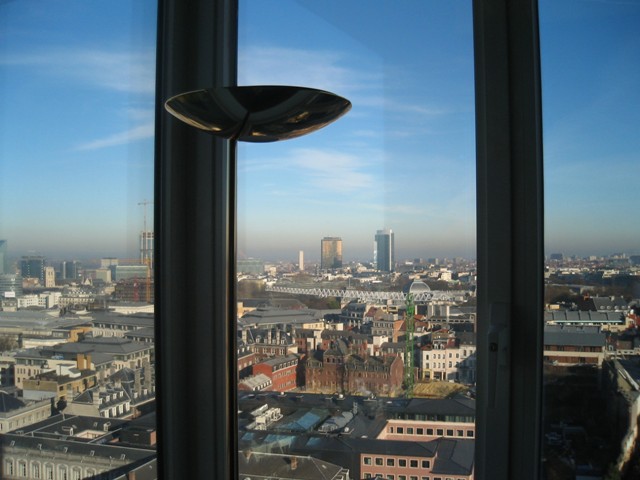
Brussels panorame from my room
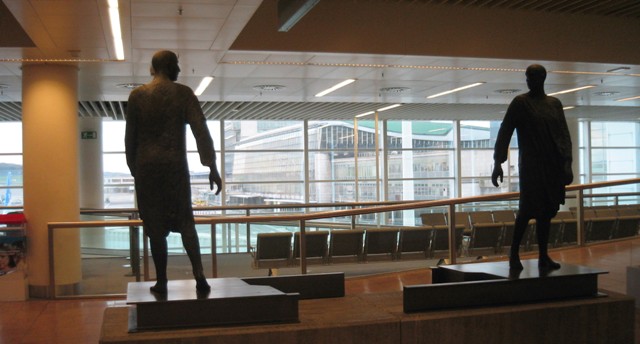
Brief encounter

Leave a Reply